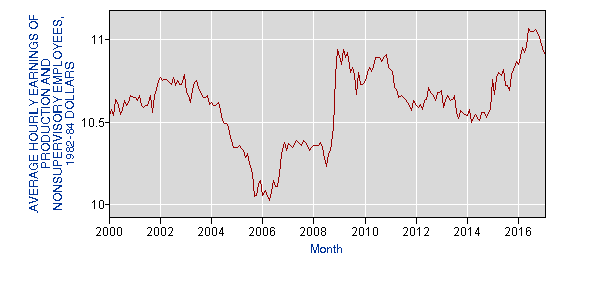April 22, 2017
The Washington Post had an interesting piece on how employers in traditionally male-dominated industries, like construction and trucking, are increasingly looking to hire women. While opening up these relatively high-paying sectors to women is certainly good news, the argument in the article really does not make sense.
The piece asserts that employers are having difficulty finding qualified workers, in large part because of the retirement of large numbers of baby boomers. If employers are really having trouble finding workers then we should see rapidly rising wages in these sectors. We don’t.
The piece focuses on iron workers, a skilled construction trade. According to the Bureau of Labor Statistics, the average real hourly wage among specialty trade contractors, the category that includes iron workers, has risen by less than 3.0 percent since its peak in 2002.
Average Hourly Earnings: Specialty Trade Contractors

Source: Bureau of Labor Statistics.
That is annual rate of increase of roughly 0.2 percent. That is not what we would expect in an occupation facing a labor shortage. (Earnings are expressed in 1982–84 dollars, multiply by roughly 2.5 to get 2017 dollars.) It’s great that doors are being opened to women, but there is not evidence of a labor shortage in this sector.
The piece also included an interesting discussion of a looming worker shortage in the trucking industry:
“The American Trucking Associations, meanwhile, declared in a recent report that the industry needs to add almost 1 million new drivers by 2024 to replace retired drivers and keep up with demand.”
In recent months there have been endless news stories about how self-driving vehicles were going to lead to mass unemployment in the trucking industry. This seems like more evidence of the which way is up problem in economics; we will either have a massive shortage of workers in the trucking industry or mass unemployment. Whichever, it clearly is a serious problem.







Comments